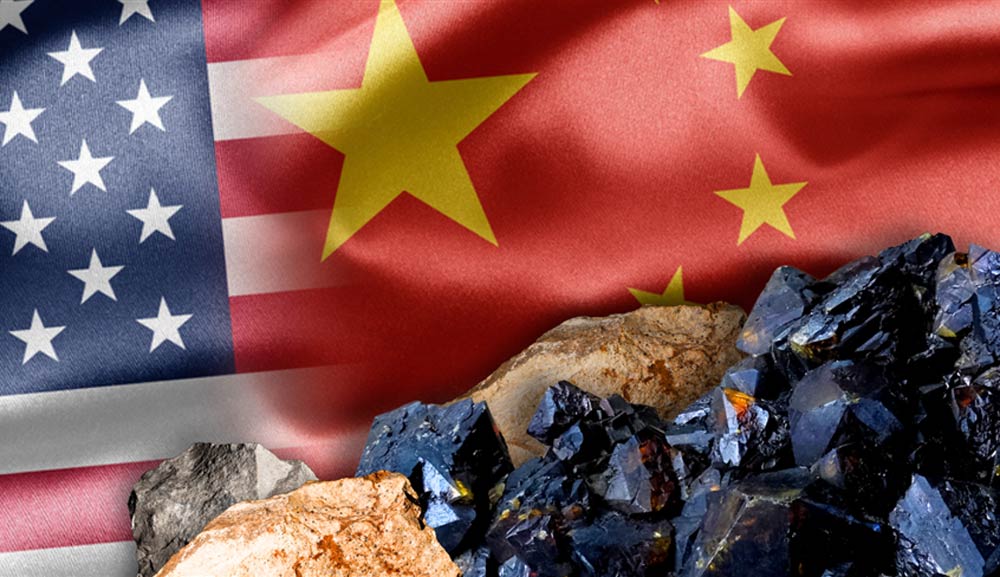In a stark reminder of the United States’ dependency on Chinese rare earth materials, the Center for Strategic and International Studies (CSIS) has warned that America lacks the capacity to replace China’s supply of crucial rare earth elements. This dependency, exacerbated by Beijing’s recent export restrictions, poses significant risks to U.S. defense, energy, and advanced technology sectors.
The Growing Supply Chain Crisis
Earlier this month, China imposed export restrictions on seven rare earth elements and magnets essential for producing advanced technologies, including fighter jets, submarines, radar systems, and electric vehicles. The elements under restriction—samarium, gadolinium, terbium, dysprosium, lutetium, scandium, and yttrium—are vital components in defense and energy infrastructure.
These new measures require Chinese companies to obtain special licenses to export rare earth materials, a move that has already disrupted supply chains. According to CSIS, the United States is particularly vulnerable to these changes due to its heavy reliance on Chinese processing facilities, which dominate the global rare earths market.
“The United States is ill-prepared to meet the shortfall in supply,” the report emphasized, highlighting that rare earths are critical to national security and advanced defense systems.
Military Readiness at Risk
China currently processes more than 85% of the world’s heavy rare earth elements, giving it unparalleled leverage over global supply chains. CSIS warns that the U.S. defense sector is especially at risk, as rare earth materials are indispensable for advanced military technologies, such as missiles, drones, and communication systems.
In addition to export restrictions, China has placed 16 U.S. entities—primarily in the defense and aerospace industries—on its export control list. Being on this list prohibits these companies from receiving “dual-use goods,” further compounding supply chain disruptions.
The timing of these restrictions is critical. The U.S. Department of Defense (DOD) has been working to develop a domestic rare earth supply chain, with a goal of achieving self-sufficiency by 2027. However, CSIS reports that this progress has been slow and inadequate, with no current heavy rare earths processing facilities operational in the U.S.
Efforts to Build Domestic Supply Chains
Since 2020, the DOD has invested over $439 million in developing domestic mining and processing capabilities. While these efforts aim to reduce dependency on China, they remain years away from producing meaningful results. Even when operational, U.S. facilities are expected to fall far short of China’s production capacity.
“Developing mining and processing capabilities requires a long-term commitment,” CSIS noted. “For the foreseeable future, the United States will remain on the back foot.”
Global Implications of China’s Monopoly
The United States is not the only nation grappling with the consequences of China’s dominance in rare earth production. Other countries, including Australia and Brazil, are working to strengthen their own supply chains. However, CSIS warns that China’s new export licensing system may incentivize global cooperation with Beijing, as nations aim to maintain access to critical materials.
Neil Shearing, group chief economist at Capital Economics, pointed out that export controls on rare earths and other critical minerals have become a key tool in Beijing’s geopolitical strategy. “China’s control over critical minerals has been weaponized and will be a defining feature of the fractured global economy,” he said.
Strategic Risks for the U.S. Economy
The CSIS report underscores the broader risks of reliance on foreign supply chains for critical materials, particularly as geopolitical tensions with China intensify. The U.S. defense industrial base, already struggling with limited capacity, faces additional strain from these restrictions.
China’s ability to acquire advanced weaponry and scale up its military capabilities far outpaces U.S. efforts. According to a U.S. Air Force official cited by CSIS, China is advancing weapons systems five to six times faster than the United States. Further disruptions in rare earth supply chains could widen this gap and weaken Washington’s military readiness.
The Path Forward
To mitigate these risks, CSIS recommends a two-pronged approach: increased investment in domestic rare earth processing and strengthened partnerships with allied nations. Financial and diplomatic support for countries like Australia and Brazil, which are developing their own rare earth capabilities, could help diversify global supply chains.
However, achieving independence from China will require patience and significant resources. The U.S. must also contend with the environmental challenges associated with rare earth mining and processing, which have slowed domestic efforts in the past.











